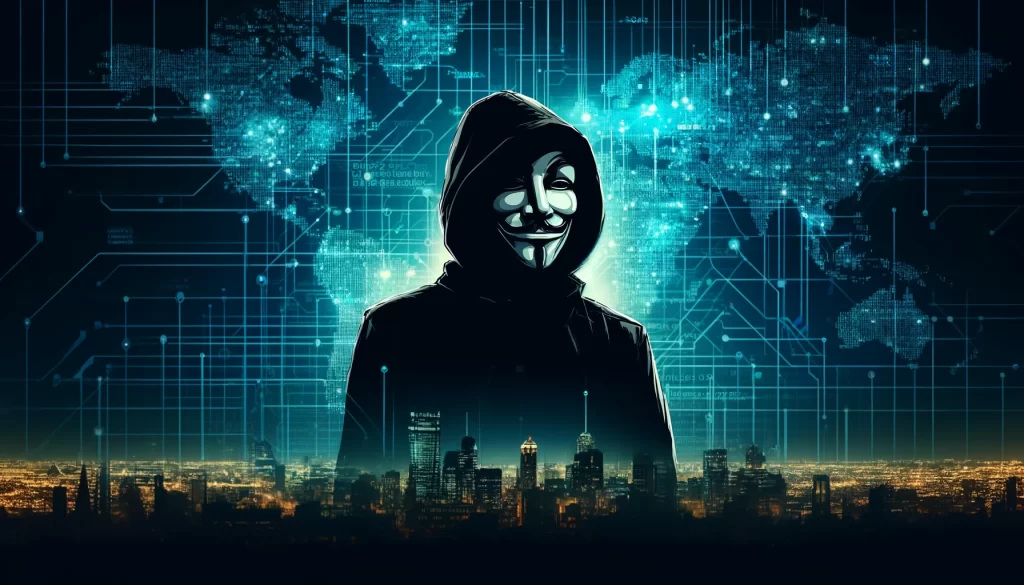Anonymous, the decentralized international hacktivist group, is famous for its high-profile cyberattacks and advocacy for freedom of information and privacy. Despite its wide-reaching influence on digital culture and politics, the origins of Anonymous are shrouded in mystery and ambiguity. This article delves into the nebulous beginnings of this group, exploring why the identity of its founders remains elusive and the implications of this anonymity.

Origins in the Digital Shadows
Anonymous first emerged from the primordial chaos of the internet, specifically from the imageboard known as 4chan, around 2003. Here, users could post anonymously, which created a breeding ground for unrestricted creativity and free speech, but also for provocative and sometimes disruptive content. The name “Anonymous” itself was derived from the default attribution of posts not marked with a username: anonymous.
Initially, the activities of Anonymous were not politically motivated or particularly organized; it was more about the “lulz” — internet slang for laughs. However, as the collective gained more followers, its activities became more focused and its targets more significant. Notable early operations included attacks against the Church of Scientology, dubbed “Project Chanology” in 2008. This was one of the first instances where Anonymous shifted from internet mischief to engaging in activities with tangible social and political motivations.
The Lack of a Central Founder
Asking who started Anonymous is akin to asking who invented talking. Because of its unique nature as a decentralized group, there is no single founder or group of founders as one might expect with traditional organizations. The collective nature of Anonymous means it has evolved organically, with different individuals stepping in and out of the spotlight at various times.
This decentralized and leaderless model is not merely a matter of operational security but also a philosophical stance. Anonymous members believe in the power of mass collaboration without the need for hierarchical structures. This allows the group to remain fluid, adapting to various causes and environments, and making it extremely difficult for law enforcement to infiltrate or dismantle them effectively.
Philosophical Underpinnings and Motivations
The driving forces behind Anonymous can be traced back to the culture of 4chan, where a disdain for authority and a deep commitment to the freedom of expression were prevalent. These ideas merged with the anarchistic ethos of disrupting systems, which many members saw as corrupt or unjust. As the group’s operations became more politically charged, they attracted activists who were more ideologically driven, particularly those concerned with issues of censorship, freedom, and corporate or governmental accountability.
Anonymous operates on the belief that information should be free and that privacy is a fundamental right. This ethos is often expressed in their actions, which have ranged from supporting whistleblowers and fighting censorship to exposing corruption and safeguarding privacy.
Impact and Legacy
The impact of Anonymous is significant and multifaceted. On the one hand, they have successfully brought attention to issues such as internet surveillance, freedom of speech, and corruption. Their ability to organize global cyber operations rapidly is a testament to their influence and the power of collective anonymous action.
On the other hand, the lack of a clear structure and leadership has led to criticisms of irresponsibility. The anonymity and lack of accountability have sometimes resulted in actions that harm innocent parties or that have unintended consequences. Moreover, the brand of Anonymous can be appropriated by anyone with internet access and a grievance, leading to a mixed bag of activities carried out under its banner.
Conclusion: The Unknowable Founders
Ultimately, the question of who started Anonymous is less relevant than understanding what the movement represents. The ethos of Anonymous transcends individual identities, focusing instead on the collective power of anonymous masses to effect change. This is both the strength and the vulnerability of Anonymous; it is as unpredictable and diverse as the internet itself.
In conclusion, while the founders of Anonymous remain unknown and may indeed be unknowable, the legacy of the movement is clear. It has reshaped how activism can be conducted in the digital age, highlighting both the potent possibilities and the profound challenges of anonymity in the era of global connectivity.